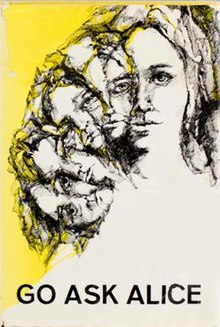 Dust jacket of Prentice Hall first edition, 1971 | |
| Author | Beatrice Sparks |
|---|---|
| Language | English |
| Genre | Young adult fiction |
| Published | 1971 |
| Publisher |
|
| Media type | Print (hardcover and paperback), ebook |
| ISBN | 0-671-66458-1 |
| OCLC | 164716 |
| LC Class | PZ7 .G534 |
Go Ask Alice is a 1971 book about a teenage girl who develops a drug addiction at age 15 and runs away from home on a journey of self-destructive escapism. Attributed to "Anonymous", the book is in diary form, and was originally presented as being the edited actual diary of the unnamed teenage protagonist.[1][2] Questions about the book's authenticity and true authorship began to arise in the late 1970s, and Beatrice Sparks is now generally viewed as the author of the found manuscript–styled fictional document.[3] Sparks went on to write numerous other books purporting to be real diaries of troubled teenagers.[2][4][5][6][7] Some sources have also named Linda Glovach as a co-author of the book.[1][8] Nevertheless, its popularity has endured, and, as of 2014, it had remained continuously in print since its publication over four decades earlier.[6]
Intended for a young adult audience, Go Ask Alice became a widely popular bestseller.[2][4][3] It is praised for conveying a powerful message about the dangers of drug abuse.[9] Go Ask Alice has also ranked among the most frequently challenged books for several decades due to its use of profanity and explicit references to sex and rape, as well as drugs.[10] The book was adapted into the 1973 television film Go Ask Alice, starring Jamie Smith-Jackson and William Shatner.[11] In 1976, a stage play of the same name, written by Frank Shiras and based on the book, was also published.[12]
- ^ a b Oppenheimer, Mark (November 15, 1998). "Just Say 'Uh-Oh': Two New Drug Novels, and the Book That Established the Genre". The New York Times Book Review. p. 36. Archived from the original on April 30, 2016. Retrieved December 21, 2016 – via Proquest.
- ^ a b c Nilsen, Alleen Pace (Summer 2013). "Reminiscing: One Perspective on ALAN's Beginnings". The ALAN Review. 40 (3). doi:10.21061/alan.v40i3.a.1. Archived from the original on July 20, 2016. Retrieved December 22, 2016.
- ^ a b Clark, Jonathan Russell Clark (July 5, 2022). "Go Ask Alice Is a Lie. But Bookstores Won't Stop Selling It". Esquire. Retrieved July 6, 2022.
- ^ a b Cite error: The named reference
yagodawas invoked but never defined (see the help page). - ^ Mikkelson, Barbara (January 4, 2008). "Go Ask Alice: Was Go Ask Alice the Real-Life Diary of a Teenage Girl?". snopes.com. Urban Legends Reference Pages. Archived from the original on September 15, 2012. Retrieved December 22, 2016.
- ^ a b White, Caitlin (July 3, 2014). "'Go Ask Alice' Is Still Awash in Controversy, 43 Years After Publication". Bustle. New York City: Bustle.com. Archived from the original on December 29, 2016. Retrieved December 29, 2016.
- ^ Hendley, Nate (2016). The Big Con: Great Hoaxes, Frauds, Grifts, and Swindles in American History. Santa Barbara, California: ABC-CLIO. pp. 161–163. ISBN 9781610695862.
- ^ Cite error: The named reference
pwwas invoked but never defined (see the help page). - ^ Chapman, Geoffrey (April 10, 1974). "'Go Ask Alice' Contains a Contemporary Message". Bennington Banner. Bennington, Vermont. p. 16. Retrieved December 23, 2016 – via Newspapers.com.
- ^ News Staff (September 7, 2010). "Banned Books: Go Ask Alice". Business & Heritage Clarksville. Clarksville, Tennessee. Archived from the original on December 18, 2016. Retrieved December 18, 2016.
- ^ Cite error: The named reference
fosterwas invoked but never defined (see the help page). - ^ Shiras, Frank (1976). Go Ask Alice: A Full Length Play. Woodstock, Illinois: The Dramatic Publishing Company. pp. 1–3. ISBN 0871294907.